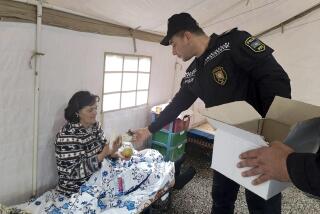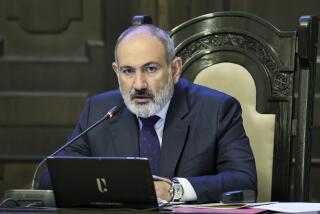Safe-Passage Deal With Afghan Rebels Reported : Food, Fuel Convoy Reaches Kabul
KABUL, Afghanistan — A convoy of several hundred trucks carrying food and fuel from the Soviet Union reached the Afghan capital virtually unscathed Saturday following a deal reportedly struck between rebels and President Najibullah.
Afghan officials said up to 600 trucks arrived in Kabul from the Soviet border town of Termez, and 300 more are expected today.
Drivers reported foul weather along the route down the Salang Highway from the Soviet border to Kabul through territory held by Muslim rebels, but only a single attack, apparently launched by a rival group not a party to the deal.
“There was only one moujahedeen attack,” said Abdul Fatah, a convoy organizer. He said three rockets were fired from mountains north of Kabul. One set fire to a fuel tanker, but the driver survived.
Allowed Safe Passage
An Afghan official said Najibullah and his Marxist People’s Democratic Party of Afghanistan government struck a deal with a rebel commander controlling Kabul province and the Salang area to allow the convoy to pass safely.
He declined to name him, but a diplomat said it probably was Ahmed Shah Masoud, the most successful moujahedeen field commander in the nine-year fight against Afghan troops and the now-departed Soviet forces.
Masoud is reported to have extended his reach northward to Kunduz province near the Soviet border.
“Yes there was a deal,” said Fatah. “Masoud does not stop food and fuel for Kabul now. The rockets were fired by Gulbuddin’s men,” he added, referring to Gulbuddin Hekmatyar, a hard-line Afghan rebel leader opposed to any compromise with Najibullah.
The deal would account for both the arrival of the convoy, which had been delayed for nearly a week, and the absence of rebel shelling or rocket attacks on Kabul in the past 12 days.
Food and Land
The official said the quid pro quo for the rebel commander would be food, land, fertilizers, an assurance that he would be allowed to retain de facto control over his areas of influence and even the right to buy arms.
The officials said that the week’s delay in the arrival of the trucks, eagerly awaited in a city short of flour, meat and fuel, was caused by snow, not rebel attacks, and that the government forces still control all four of the main roads leading to the city.
A deal with Masoud could bolster Najibullah and his party against the rival government elected by rebel political leaders at a council meeting, or shura, in Pakistan last month.
It would also lend credence to reports of a rift between rebel political leaders and the moujahedeen fighters who waged the war against Soviet and Afghan troops.
Hard Winter
The past winter has been the worst in years in Afghanistan, and snow still lies thick on the hills surrounding Kabul.
In spite of shortages, most foods are still widely available in Kabul at a price. The poor are the worst affected, but there appears to be no threat of starvation.
Fruit, vegetables, cooking oil and other necessities are on display in the shops and bazaars and those lining up for bread are mainly poor people unable to afford decontrolled prices.
Some officials said a voucher system for bread, gasoline, sugar and some other staples would be announced this week. It was not clear whether the convoy’s arrival would alter this.
The most visible effect of the shortages is the lack of traffic on the roads because of the scarcity of gasoline.
More to Read
Sign up for Essential California
The most important California stories and recommendations in your inbox every morning.
You may occasionally receive promotional content from the Los Angeles Times.










